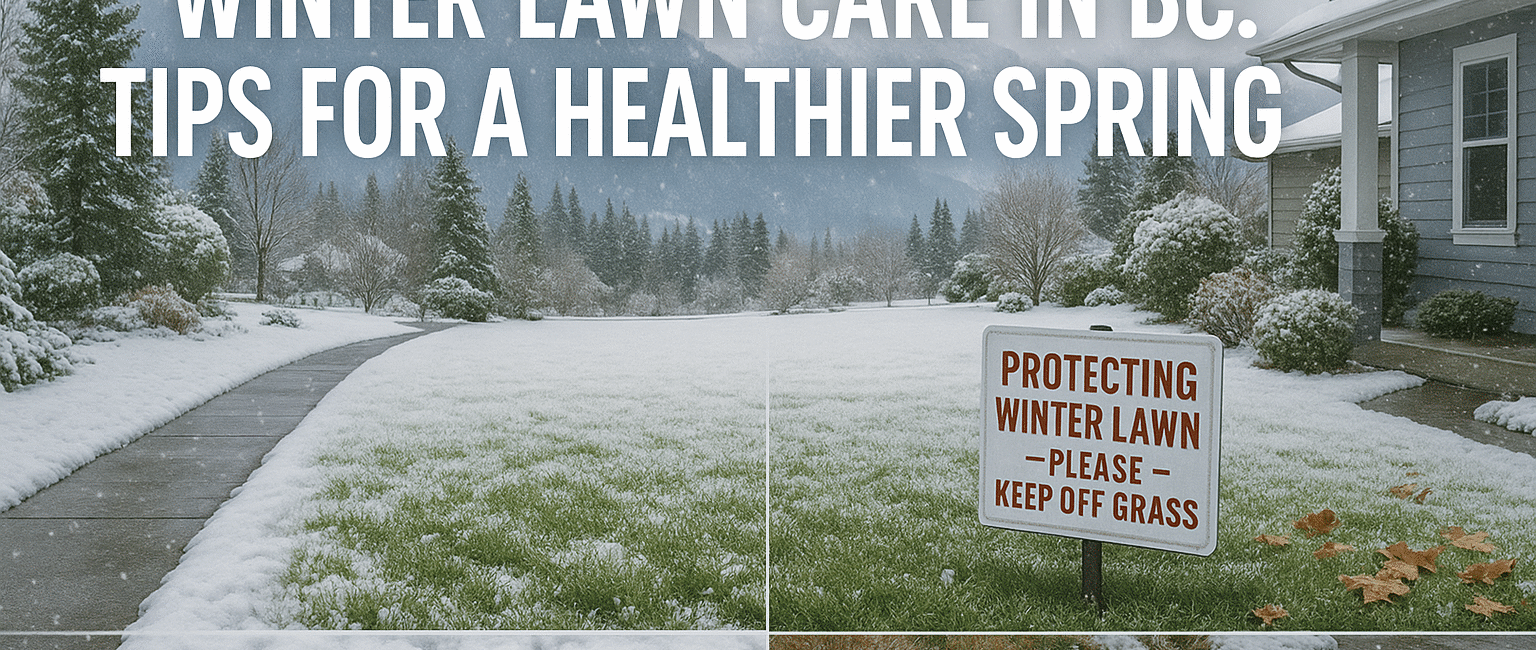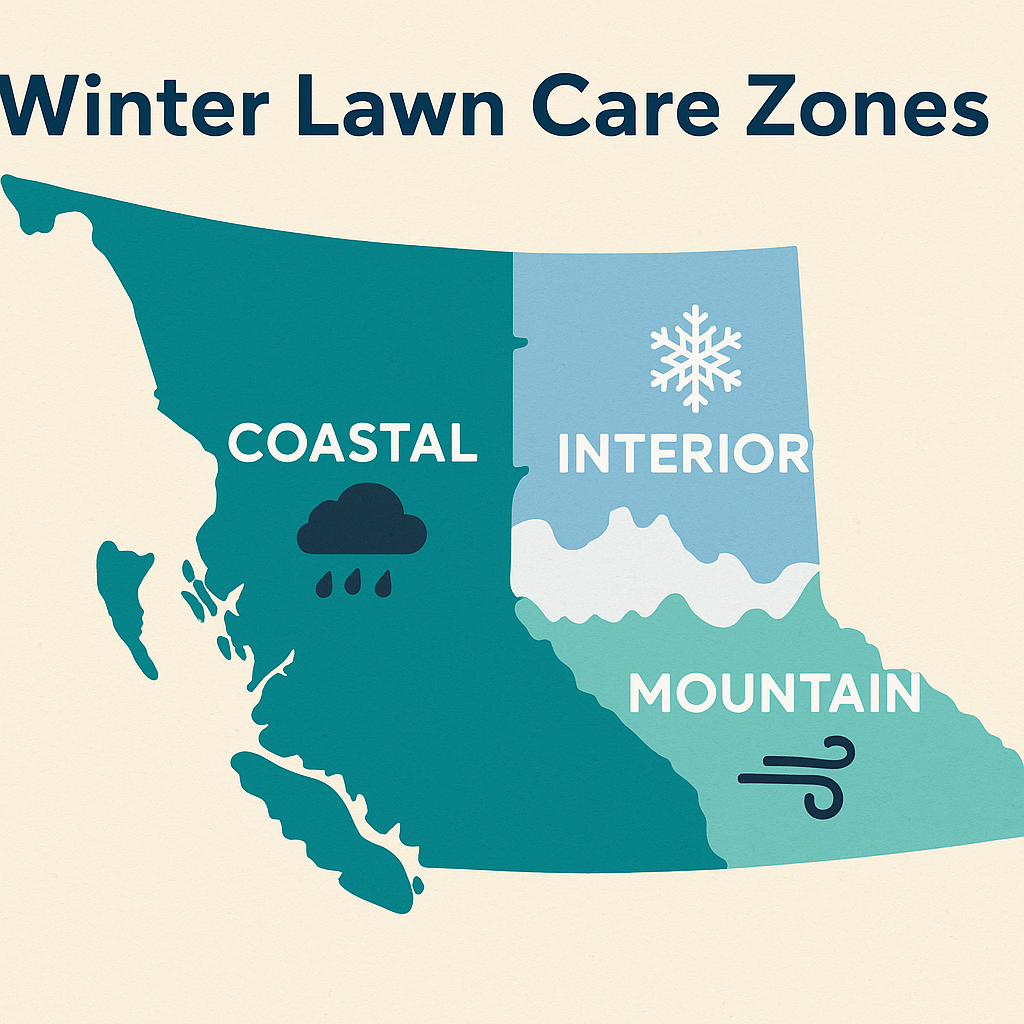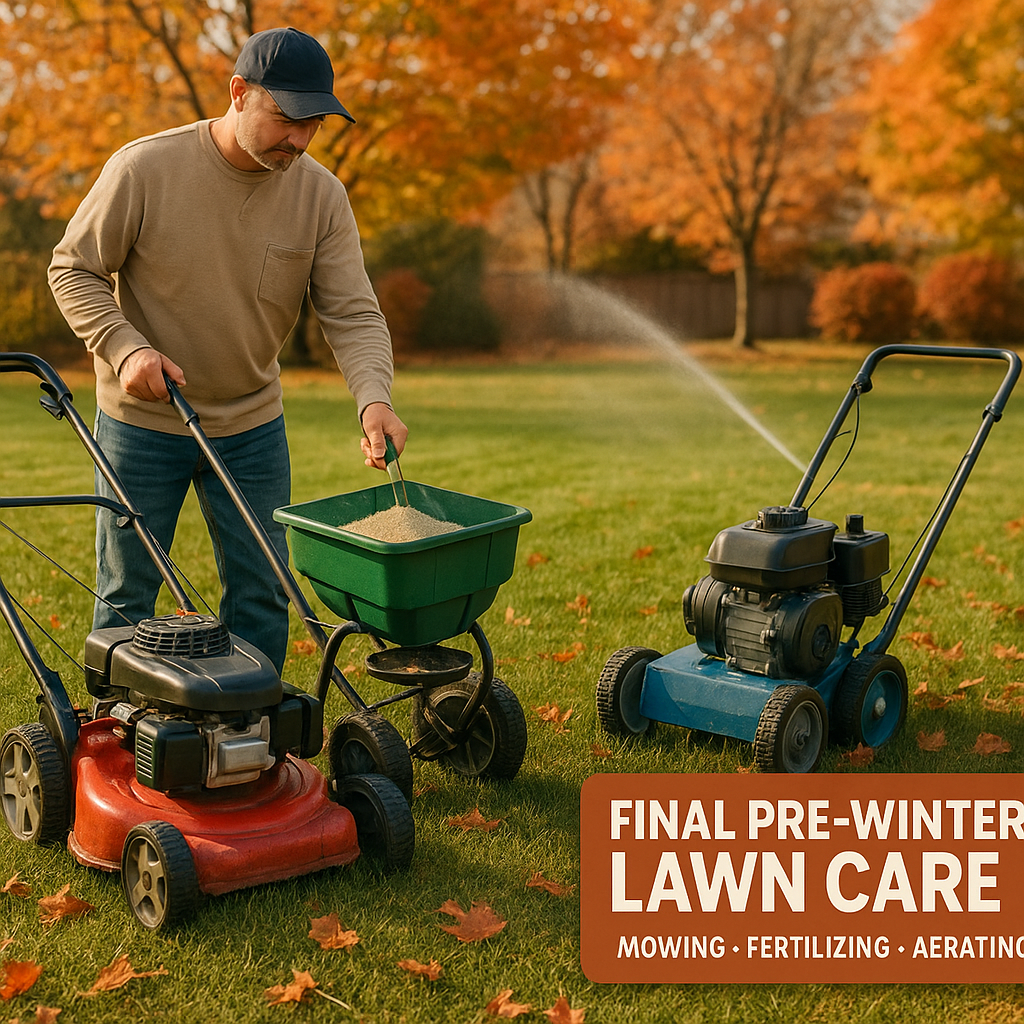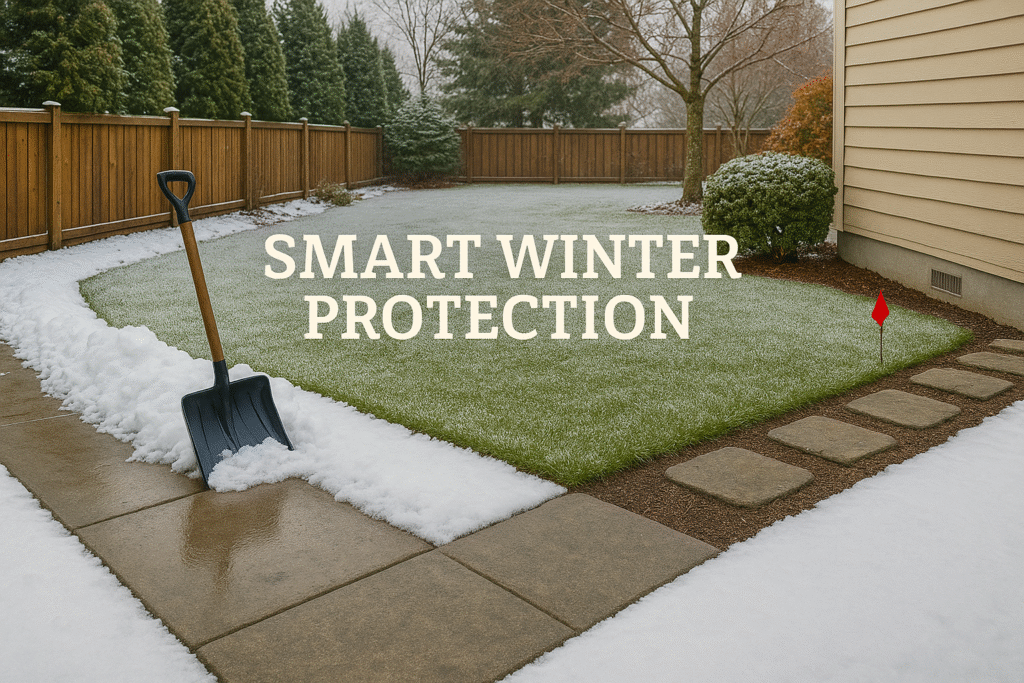
Winter in British Columbia can be tough on your lawn, but with the right approach, you can keep your grass healthy and ready to thrive come spring! Whether you’re dealing with Vancouver’s wet winters or the snow-covered landscapes of the Interior, these proven strategies will help protect your investment and ensure a lush, green lawn when warmer weather returns.
Understanding BC’s Winter Challenges for Your Lawn 🌧️
British Columbia’s diverse climate zones present unique challenges for winter lawn care. From the coastal regions experiencing heavy rainfall and mild temperatures to the interior’s freezing conditions and snow cover, your grass faces different stressors depending on your location.
The key is recognizing that grass in winter doesn’t go completely dormant in many BC areas – it slows down significantly but still needs basic care to survive and prepare for spring growth.

Pre-Winter Preparation: Set Your Lawn Up for Success 🍂
Final Mowing Strategy
Your last mow of the season is crucial. Cut your grass slightly shorter than usual (about 2-2.5 inches) to prevent matting under snow and reduce the risk of fungal diseases. However, don’t scalp it – leaving some length helps protect the crown of the grass plants.
Fertilization Focus
Apply a winter-specific fertilizer in late fall (typically October in most BC regions). Look for fertilizers high in potassium, which strengthens grass roots and improves cold tolerance. Avoid nitrogen-heavy fertilizers that encourage top growth when the plant should be focusing energy on root development.
Aeration and Overseeding
Fall aeration is particularly important in BC’s clay-heavy soils common in the Lower Mainland. This improves drainage and reduces the risk of waterlogged roots during wet winter months. If your lawn has thin spots, overseed immediately after aeration.

Winter Protection Strategies for BC Lawns ⛄
Managing Moisture and Drainage
BC’s wet winters can be more damaging than cold temperatures. Ensure proper drainage by:
- Clearing gutters and downspouts to direct water away from lawn areas
- Avoiding walking on waterlogged grass, which compacts soil and damages roots
- Creating drainage channels in low-lying areas where water pools
Snow and Ice Management
For areas that receive snow:
- Never use rock salt or ice melt on your lawn – these chemicals severely damage grass
- Shovel snow off walkways onto non-grass areas when possible
- Avoid piling snow higher than 12 inches on grass areas, as this can lead to snow mold
- Mark sprinkler heads and lawn edges to prevent damage from snow removal equipment
Protecting High-Traffic Areas
Winter foot traffic can severely damage dormant grass. Create designated pathways using:
- Stepping stones or temporary walkways
- Mulched paths through garden areas
- Strategic placement of planters to guide foot traffic

Regional Considerations Across BC 🏔️
Lower Mainland (Vancouver, Burnaby, Surrey)
Focus on drainage and fungal disease prevention. The mild, wet climate keeps grass semi-active, making it susceptible to diseases like snow mold and brown patch.
Vancouver Island (Victoria, Nanaimo)
Similar to the Lower Mainland but with less extreme weather. Continue light maintenance throughout winter, including occasional raking of heavy leaf accumulation.
Interior BC (Kamloops, Kelowna, Prince George)
Prepare for true dormancy. Focus on pre-winter preparation and protecting grass from freeze-thaw cycles. Avoid any winter activity on frozen grass.
Fraser Valley
Combat both wet conditions and occasional freezing. Pay special attention to drainage while preparing for potential snow cover.
Common Winter Lawn Care Mistakes to Avoid ⚠️
- Walking on frozen or waterlogged grass – This breaks grass blades and compacts soil
- Leaving thick leaf cover – While some leaves provide protection, thick layers block light and trap moisture
- Using summer fertilizers in late fall – High nitrogen content encourages growth when plants should be hardening off
- Ignoring drainage issues – Poor drainage kills more grass in BC winters than cold temperatures
- Aggressive snow removal – Scraping snow removal tools on grass surfaces damages crowns and roots
Preparing for Spring Success 🌸
As winter winds down (typically February-March in most BC areas), start planning your spring recovery:
- Avoid early spring traffic on soft, wet lawns
- Plan for overseeding thin or damaged areas once soil temperatures rise
- Schedule professional aeration for early spring if you missed fall treatment
- Test soil pH and plan amendments for optimal spring growth
Professional vs. DIY Winter Lawn Care 🛠️
While many winter lawn care tasks are manageable for homeowners, some situations benefit from professional expertise:
DIY-Friendly Tasks:
- Regular debris removal
- Basic drainage improvements
- Protecting high-traffic areas
- Monitoring for pest or disease issues
Consider Professional Help For:
- Major drainage problems
- Large-scale aeration projects
- Disease identification and treatment
- Irrigation system winterization
- Soil testing and amendment recommendations
📞 Ready to Ensure Your Lawn’s Winter Success?
Don’t let BC’s challenging winter weather damage your beautiful lawn! Whether you need professional aeration, drainage solutions, or expert advice on winter lawn care, BCServiceFinder.ca connects you with trusted local lawn care professionals who understand BC’s unique climate challenges.
Visit BCServiceFinder.ca today to get matched with experienced lawn care experts in your area. From Vancouver to Victoria, Kamloops to Kelowna – find the right professional to keep your grass healthy all winter long!
Frequently Asked Questions About Winter Lawn Care in BC ❓
Should I rake leaves off my lawn before winter in BC?
Yes, but leave some light leaf cover for protection. Remove thick layers that completely cover grass, as they block sunlight and trap excess moisture, leading to fungal diseases common in BC’s wet climate.
Can I walk on my lawn during winter in BC?
Avoid walking on frozen or waterlogged grass. In BC’s variable winter conditions, grass can be particularly vulnerable when transitioning between frozen and thawed states. Create designated pathways to protect your lawn.
When should I stop fertilizing my lawn in BC?
Apply your final fertilizer application in late October to early November, depending on your specific location in BC. Use a winter-specific, potassium-rich fertilizer rather than nitrogen-heavy summer blends.
How do I prevent snow mold on my BC lawn?
Ensure good air circulation by raking leaves, avoid excessive snow piling, and maintain proper drainage. Snow mold thrives in areas where snow sits on unfrozen ground for extended periods, common in BC’s variable winter temperatures.
Is it normal for grass to stay somewhat green during BC winters?
Yes! In milder BC regions like the Lower Mainland and southern Vancouver Island, grass often remains semi-active during winter due to the temperate climate. This is normal but means your lawn still needs basic care throughout the winter months.
Found this helpful? 👍 Please share this post with your friends on Facebook so they can make better decisions about their winter lawn care too! A healthy lawn benefits the whole neighborhood, and sharing knowledge helps our BC communities maintain beautiful, sustainable landscapes year-round.


